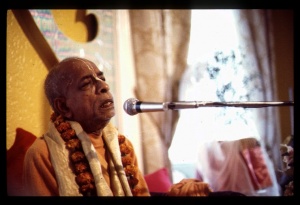SB 2.3.13: Difference between revisions
No edit summary |
(Vanibot #0054 edit - transform synonyms into clickable links, which search similar occurrences) |
||
| Line 24: | Line 24: | ||
<div class="synonyms"> | <div class="synonyms"> | ||
''śaunakaḥ uvāca'' | ''[//vanipedia.org/wiki/Special:VaniSearch?s=śaunakaḥ&tab=syno_o&ds=1 śaunakaḥ] [//vanipedia.org/wiki/Special:VaniSearch?s=uvāca&tab=syno_o&ds=1 uvāca]'' — Śaunaka said; ''[//vanipedia.org/wiki/Special:VaniSearch?s=iti&tab=syno_o&ds=1 iti]'' — thus; ''[//vanipedia.org/wiki/Special:VaniSearch?s=abhivyāhṛtam&tab=syno_o&ds=1 abhivyāhṛtam]'' — all that was spoken; ''[//vanipedia.org/wiki/Special:VaniSearch?s=rājā&tab=syno_o&ds=1 rājā]'' — the King; ''[//vanipedia.org/wiki/Special:VaniSearch?s=niśamya&tab=syno_o&ds=1 niśamya]'' — by hearing; ''[//vanipedia.org/wiki/Special:VaniSearch?s=bharata&tab=syno_o&ds=1 bharata]-[//vanipedia.org/wiki/Special:VaniSearch?s=ṛṣabhaḥ&tab=syno_o&ds=1 ṛṣabhaḥ]'' — Mahārāja Parīkṣit; ''[//vanipedia.org/wiki/Special:VaniSearch?s=kim&tab=syno_o&ds=1 kim]'' — what; ''[//vanipedia.org/wiki/Special:VaniSearch?s=anyat&tab=syno_o&ds=1 anyat]'' — more; ''[//vanipedia.org/wiki/Special:VaniSearch?s=pṛṣṭavān&tab=syno_o&ds=1 pṛṣṭavān]'' — did he inquire from him; ''[//vanipedia.org/wiki/Special:VaniSearch?s=bhūyaḥ&tab=syno_o&ds=1 bhūyaḥ]'' — again; ''[//vanipedia.org/wiki/Special:VaniSearch?s=vaiyāsakim&tab=syno_o&ds=1 vaiyāsakim]'' — unto the son of Vyāsadeva; ''[//vanipedia.org/wiki/Special:VaniSearch?s=ṛṣim&tab=syno_o&ds=1 ṛṣim]'' — one who is well versed; ''[//vanipedia.org/wiki/Special:VaniSearch?s=kavim&tab=syno_o&ds=1 kavim]'' — poetic. | ||
</div> | </div> | ||
Latest revision as of 21:15, 17 February 2024

A.C. Bhaktivedanta Swami Prabhupada
TEXT 13
- śaunaka uvāca
- ity abhivyāhṛtaṁ rājā
- niśamya bharatarṣabhaḥ
- kim anyat pṛṣṭavān bhūyo
- vaiyāsakim ṛṣiṁ kavim
SYNONYMS
śaunakaḥ uvāca — Śaunaka said; iti — thus; abhivyāhṛtam — all that was spoken; rājā — the King; niśamya — by hearing; bharata-ṛṣabhaḥ — Mahārāja Parīkṣit; kim — what; anyat — more; pṛṣṭavān — did he inquire from him; bhūyaḥ — again; vaiyāsakim — unto the son of Vyāsadeva; ṛṣim — one who is well versed; kavim — poetic.
TRANSLATION
Śaunaka said: The son of Vyāsadeva, Śrīla Śukadeva Gosvāmī, was a highly learned sage and was able to describe things in a poetic manner. What did Mahārāja Parīkṣit again inquire from him after hearing all that he had said?
PURPORT
A pure devotee of the Lord automatically develops all godly qualities, and some of the prominent features of those qualities are as follows: he is kind, peaceful, truthful, equable, faultless, magnanimous, mild, clean, nonpossessive, a well-wisher to all, satisfied, surrendered to Kṛṣṇa, without hankering, simple, fixed, self-controlled, a balanced eater, sane, mannerly, prideless, grave, sympathetic, friendly, poetic, expert and silent. Out of these twenty-six prominent features of a devotee, as described by Kṛṣṇadāsa Kavirāja in his Caitanya-caritāmṛta, the qualification of being poetic is especially mentioned herein in relation to Śukadeva Gosvāmī. The presentation of Śrīmad-Bhāgavatam by his recitation is the highest poetic contribution. He was a self-realized learned sage. In other words, he was a poet amongst the sages.